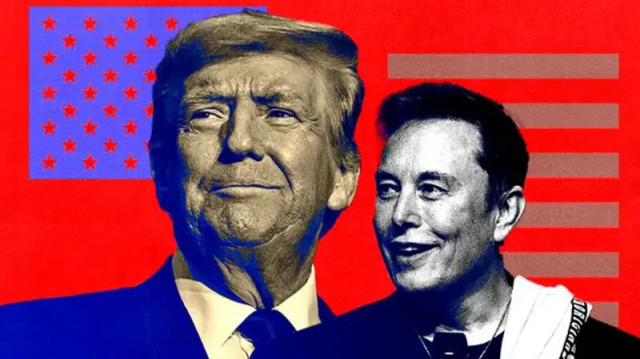

File photo
Experts warn of growing global efforts by US, France, and China to control social media platforms
The neutrality of social media has come under scrutiny as it faces new challenges, especially after President-elect Donald Trump selected X platform owner Elon Musk to lead a new federal agency, the “Department of Government Efficiency.”
Faik Tanrikulu, associate professor of humanities at Istanbul Medipol University, told Anadolu that the issue of social media neutrality has been increasingly debated in recent years.
Tanrikulu explained that while Musk has lifted certain content restrictions on X in the name of freedom of speech, he has also faced criticism for allowing some political views while suppressing others.
“For instance, while pro-Ukraine sentiment was (algorithmically) promoted during the Russia-Ukraine war, pro-Russia content was restricted on X, and similarly, during Israel's attacks on Gaza, pro-Palestinian sentiment was restricted while pro-Israel posts were left untouched,” said Tanrikulu.
“Such interventions reinforced the perception of Musk, as his personal preferences on the platform's financial interests overshadowed his (purported) neutrality and advocacy for freedom of speech,” he added.
- Concerns about X credibility, neutrality
Tanrikulu noted that The Guardian's decision to stop posting on X following Musk's appointment to the new federal agency reignited long-standing concerns about the platform's credibility and its supposed neutrality.
The UK-based newspaper stated that “X is a toxic media platform” and that Musk “has been able to use its influence to shape political discourse.”
Similarly, German soccer club SV Werder Bremen announced their departure from the platform, encouraging followers to join them on Bluesky, a rival social media platform. The club cited the prevalence of hate speech disguised as free speech on X as the reason for leaving.
- Driving social change and inciting chaos
Tanrikulu emphasized that social media platforms have revolutionized society, enabling people to engage in democracy and voice their criticisms of governments. However, he also warned that these platforms can both drive social change and incite chaos.
He pointed to the Arab Spring protests as an example of the positive power of social media in organizing mass movements against governments.
“Platforms like Facebook and Twitter played a crucial role in these protests and the rapid spread of mass movements against governments,” he said.
“However, we have seen in the UK the negative impacts of organizing masses to protest over social media, and how disinformation can result in actual danger,” he noted. “A false report about the murder of three people at the hands of migrants spread rapidly online and led to protests and violence on the streets, and despite its falsehood, the effects of the chaos created by social media were felt and continue to be felt for a long time.”
- Social media vs national security
Tanrikulu highlighted the ongoing tension between the neutrality and independence of social media platforms and the increasing pressure from governments. One example is the US's stance on the Chinese app TikTok.
The US has made several attempts to ban or regulate TikTok over concerns that it poses a threat to national security, citing the alleged sharing of user data with the Chinese government.
“A complete ban on TikTok was on the agenda during Trump's first term, and while the Biden administration demanded strict regulations on TikTok's activities in the country, it made it clear that the US is taking a tougher stance against social media platforms it can't control,” he said.
Tanrikulu noted that France has also taken action against Telegram, the encrypted messaging app, alleging its use by criminals and terrorists.
“Telegram's end-to-end encryption has been criticized for allegedly platforming criminal activity, and these allegations, coupled with the terrorist attacks in Paris, in which Telegram was alleged to have been used to organize, France was prompted to pressure the platform,” he said.
Tanrikulu explained that China has taken a different approach, banning Western platforms like Facebook, X, Instagram, and YouTube, and replacing them with domestic alternatives to protect its national and cultural sovereignty.
He pointed out that Chinese platforms like WeChat and Weibo operate under government control, which has raised concerns about the suppression of freedom of speech in the West.
“China increased its control on Facebook and X during the Hong Kong protests in 2019 and reinforced its criticism of social media platforms that they incite and encourage foreign interference,” he said.
“The EU took a unique approach to this with the Digital Services Act, introducing comprehensive regulations on social media platforms intended to prevent disinformation, hate speech, and illegal content, requiring platforms to be more transparent in content moderation and to improve user security, though these have been interpreted as an interference in the freedom of speech,” he added.
- 'War of control'
Tanrikulu stressed that these examples show how social media platforms face increasing pressure from governments for control. While these efforts are often justified in the name of protecting freedom of speech and user privacy, countries sometimes interfere with social media platforms citing national security concerns.
“This war (between countries for control and platforms to decide their own operations) often puts both the rights of users and freedom to access information at risk,” he said.
Tanrikulu concluded that while social media platforms claim to defend freedom of speech and democracy, they often prioritize their own financial and ideological interests.
#Elon Musk
#social media
#trump
#US
